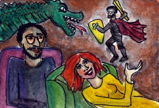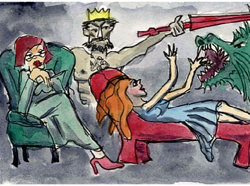The "Long Night of Psychoanalysis" in Berlin:
Review and Perspectives

The Berlin project of participating in the „
Lange Nacht der Wissenschaften“ (LN) started in 2013 and meanwhile has completed its fourth run in 2017. The idea emerged in a group of colleagues gathered from all psychoanalytic institutes who are concerned with the socio-political prospect of our profession. Already in the first year of our participation we were able to establish an organiza-tional cooperation with the International Psychoanalytic University (IPU) which since then allows us not only to use the technically well equipped facilities of the university, but also its staff re-sources and logistic support. Over the years it turned out to be an alliance of mutual benefit.
In this organizational network we can represent a wide range of applications of psychoanalytic theories: individual and group analysts, child and adolescent therapists, analysts of Jungian, Adler-ian, Freudian and Kleinian provenance with their different specificities, colleagues from the DPV and the DPG, from former East-Germany and West-Germany – all get together and share and discuss their views of psychoanalysis with the public visitors.
What is it that makes so many analysts after the soaring flight of the first year still regularly attend the project meetings in the evenings after daily work?
In Berlin we look back at a history of disruptions, losses and schisms. What separates us is consid-erable indeed. But nevertheless we team up in pragmatic pluralism and we succeed in putting aside aspects of rivalry or differences in educational standards and practice. We all depend on a com-mon ground poor of friction, but this may occasionally lead to a blurring between our different schools of thinking and respective positions with regard to academic contents. Though we enjoy the pleasant experience of not only flock with birds of the same feather or the same pedigree, but cross borders; nevertheless we meanwhile feel secure enough to stay with our differences and our diversities and are able to discuss with less fear and rigidity common and indeed controversial is-sues.
Participating in the LN we walk out of our offices, our Institutes, our consuming struggle to find our own position and our narcissistic viability within the wide range of psychoanalytic theories and their societies, the confining ivory towers, the reference to ourselves – out on the boulevard: shrinks go public. We reach out to neighbouring sciences, look for fresh fashions of dialogue, discipline ourselves to a communicative language (which is not an easy task) and try to invent new formats of performance. We work with the concept of lecture rooms: by using striking headings for the rooms like “Denk-Raum“ („Think-space”) or “Fühl-bar” we tie together presentations with related subjects or concepts. We also try to enliven the functional and somewhat sober seminar rooms with moderate decoration, i.e. warm light and easy chairs. The visitors are welcomed to each room by so called “room officers”, who are responsible for the “hardware” (chairs, tables, media, airing between the presentations) but also for the “software” (introduction of the presen-ters, moderation, watching the time table etc.) We thus create places and room [kein Plural] where in a rapidly changing and sometimes threatening world thoughts and feelings may settle and get new impulses.

Our visitors become acquainted with psychoanalysis not as patients. And during the LN we as analysts meet an eager, inquiring, interested and interesting audience, which comes well prepared and well in time for the first event and with surprising constancy follows even several consequent one-hour presentations with engagement and participation. Thus often lively and concentrated discussions develop and sometimes those close moments occur where the power of psychoanalysis becomes sensible for everyone.
What repeatedly surprises us is the wide range of different professional backgrounds of our visi-tors and how closely connected to psychoanalysis they already are. There seems to be a broadly based societal interest in this field. This is true also for the program especially made for young and very young (with parents) visitors and we definitely intend to expand at this point.
With this report on our experience we would like to encourage our colleagues worldwide to take the chance and reach out to our known and unknown “followers” and to place undogmatic psy-choanalysis into the societal discourse.
General data for 2017:
Presentations every hour between 5:00 and 12:00 p.m.
in 8 thematically labelled rooms
and in one lecture hall, taking turns with the IPU every hour;
44 different program elements;
counted visitors: 2149
and not to be counted: the motivated energy of many colleagues and related persons
Barbara Strehlow, Helga Becker, Paola Acquarone